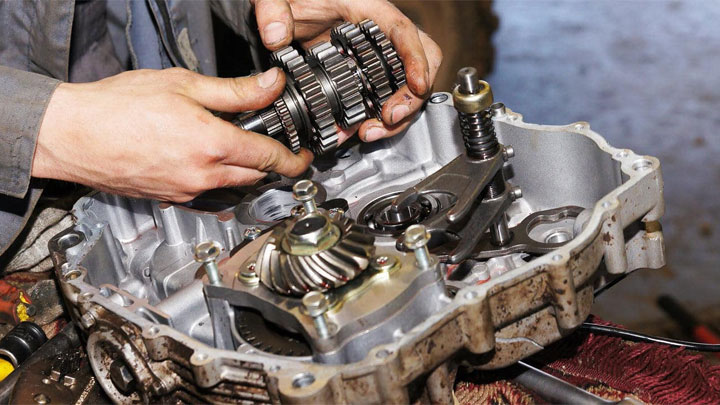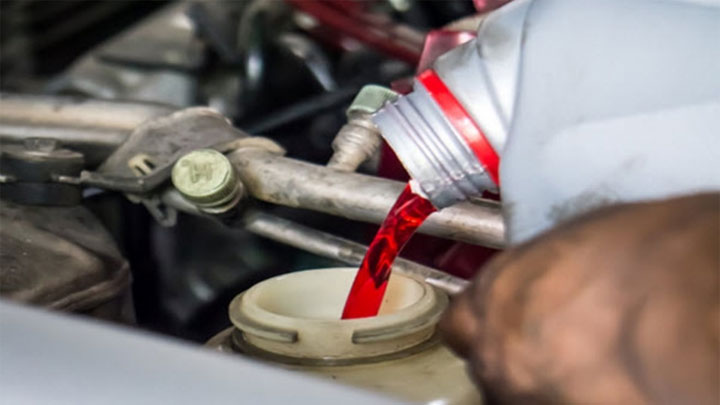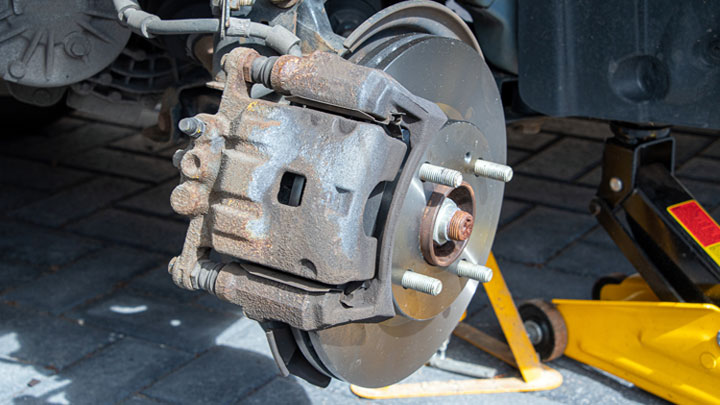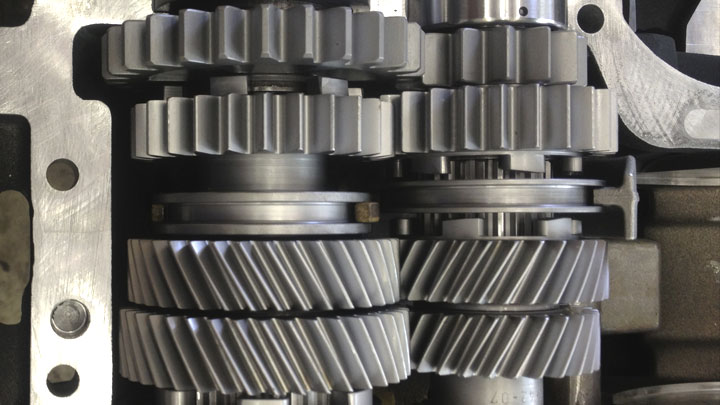Last Updated on October 17, 2022
The transmission of a vehicle is crucial for it to move and operate properly. The job of a transmission is to transmit power from the engine and deliver it to the wheels of the driving mechanism.
There is a gearbox connecting to the transmission which lets the driver change gears. When the gears are changed, the rotating power and speed in the engine are converted based on the demands being put on it.
Like engines, the transmission contains many moving parts and components which constantly need to be lubricated. Transmission fluid is used to as a lubricant for these parts to keep them running smoothly and to cool them down in case they start to heat up.
After a while, your transmission fluid will get old and debris may start to build up in it. That is why most car manufacturers will recommend that you change your transmission fluid every 50,000 to 100,000 miles. This ensures the fluid is fresh and will not cause you any problems while out on the road.
See Also: Transmission Fluid Change vs Flush
Top 2 Reasons For Transmission Problems After a Fluid Change
When you change your transmission fluid, you should not have any problems shifting gears or maintaining certain driving speeds. You also shouldn’t hear any unusual noises or experience any unusual symptoms.
However, there are cases when drivers will feel something wrong or hear noises coming from the transmission soon after they have changed their transmission fluid. This often makes them wonder why because they figure changing the fluid would have prevented strange things like this from happening.
So, why do these problems occur after the fluid has been changed? Below are two of the most common causes after a fluid change.
Related: Transmission Fluid Color Chart
#1 – Varnish Deposits

When you have old or burnt transmission fluid, it may become discolored and cause varnish deposits to build up inside the system. These deposits typically float around the old fluid and don’t really build up anywhere as you continue using the same fluid.
However, once you change the old fluid with new fluid, these deposits get washed away and it becomes sludge that sticks to the filters of your transmission system. This prevents transmission fluid from flowing through the transmission, which results in those strange noises to be heard.
Therefore, you need to flush your transmission before adding new fluid. That is the best way to ensure that no pathways get clogged within the transmission.
See Also: 7 Symptoms of Overfilled Transmission Fluid
#2 – Wrong Type of Transmission Fluid

It is best not to use traditional transmission fluid that is petroleum-based because these will leave the most deposits behind. Once these deposits build up on your filter and restrict the transmission fluid from flowing, it will cause the transmission’s components to heat up and create more friction.
This will result in clunking and other noises that you don’t want to hear. Fortunately, there are synthetic transmission fluids which are formulated to ensure that these components stay lubricated and that the gears shift smoothly. You will find this fluid marketed as “trans medic” in most cases.
Related: How Often to Change Transmission Fluid
Transmission Fluid Cost
The good news is that changing transmission fluid isn’t horribly expensive. Expect to pay $40 to $100 for new fluid since most modern vehicles need anywhere from 5 to 15 quarts. You’ll also need a filter and possibly a new pan gasket. However, the hardest part for most people will be replacing the old transmission fluid with the new fluid.
For this, you may have to go to a mechanic and have them perform the job for you. This will mean paying their hourly labor charge of between $80 and $110. So at minimum, you’re looking at a total cost of between $150 to $250 when you get your transmission fluid replaced by a professional.
Also, you may need to have them clean and flush the transmission too, so you can ensure that those deposits built up in the system are removed.





I have maintained my 2016 Honda Accord 159,000 miles one owner regularly with the dealership. In April I had a transmission flush. Everything was good from what the mechanic said. Yesterday my transmission went completely out! No warning signs that I am aware of. The same dealership said there is metal all in my fluid. Can it happen that fast? Please help I feel like they are going to give me the run around
Yeah, I suppose it’s possible. Perhaps you didn’t notice the warning signs (for instance, hard shifting or a slight humming that wasn’t there before). It’s also possible something inside the transmission wore out over time. Maybe the shop in April put the wrong fluid in, or didn’t add enough transmission fluid. It’s hard to say without inspecting the failed transmission to determine the root cause of the failure.
Honda Specifically states you are not to “Flush” your transmission. You should only complete a drain and fill.
Is that for all hondas or some? I have a 2012 honda civic with 107000 miles on it that I was told by a mechanic needed a flush and fill trans service.
Scotty Kilmer on Youtube said that the engine must be turned off when changing fluid or the transmission will be low on fluid and cut itself, unless it’s refilled simultaneously.
Had a transmission flush on a 2008 pontiac g6 gxp…6 speed auto.
The next day,took it for a drive,let of the gas pedal,and when i pushed on it again,nothing…the car only revved up.
I got no codes..no warning…
Seems if i shut the car off,restart it it will move a short distance,then nothing again!!!!
Is it possible,that something got clogged in the valve body,durning the flush????
Car was running with any problems before i had this done.
Did u find the solution to the r problem ???
Hi interesting reading- have a problem hope you can help. Had automatic gearbox box of my 1960 Cadillac reconditioned after only 200 miles the pipe came off losing fluid stopped within 200 yards pipe reconnected new fluid added. Then after only about 2 miles transmission slips with not pull at all. Leave to cool will drive a gain until hot.
I assume some damage done when lost fluid but just 200 yards thought be ok- can you advise on this
I’m really not sure what happened. You may want to have a transmission shop take a look at it.
Yesterday I changed my AFT and my car lost power.what’s the issue kindly
What is an AFT? Did you perhaps mean ATF? I will need more information about the problem before I am able to help.
Were you running the vehicle while you were changing the ATF? When did the vehicle lose power? Were there any other symptoms such as a check engine light?
I changed my 2008 outback transmission and filter and know my car is not wanting to start and apr is acting up
Will the engine turn over? Did you replace the whole transmission or just the transmission fluid and filter?
So i add 2 1/2 quarts of transmission fluid to my 2003 nissian Xterra and its still having a hard time shifting 3000 rom what else could be the problem
There could be any number of problems with the transmission. Are you able to narrow the scope of the problem any further?
Do you hear any strange noises? Are there any conditions that will make the problem better or worse?
hi i changed my my gear oil yesterday for my nissan sentra . since i was facing low speed in my car , i changed the oil for gear box. after changing the gear box oil, my vehicle speed does not rise immediately. i need to give long acceleration, to rise. please advise why this happening.
I don’t know. I think it would be best to have it checked by a professional in your area.
Just had my transmission changed at dealership 16000 miles and my transmission went out !.?what should I do
I’m not sure I understand. Was the transmission changed twice? Was it replaced under warranty? If the transmission was replaced under warranty and the vehicle is running fine now, I’m not sure there is anything left to do.
Should I drain & fill, flush & replace or leave the transmission fluid as is for a 2014 Cruze diesel (VIN 1G1P75SZ6E7101005) 150,000 miles that has never had any fluid changed?
Thanks
Generally a flush at that high of mileage is not recommended, especially when the vehicle has never had its transmission fluid changed. This can sometimes cause transmission slipping, but check with a local mechanic or the factory service manual to be sure in your case.
Are you experiencing any problems with the vehicle that made you want to try changing the transmission fluid?
Sean,
No problems. I just want it to last a long time.
If it were my car I’d probably leave it. Best to defer to a mechanic who can see the car in person though.
My 99 chevy silverado 1500 isnt shifting out of gear after changing the filter and fluid. It was having trouble shifting and technician said filter and fluid was due to ne changed.
Sounds like maybe an issue besides the fluid. Did the technician perform any further diagnosis?
Just got humming sound with my 2007 Murano so checked with OBDII by mechanic and P0746 & P0868 got these code. So mechanic advised change the fluid & filter as car already done 100000km so did it but after change that car moving (hardly 1 or 2 metr forward/revers only) and lost its power. mechanic couldn’t find the reason. would you any advise to fix it… would be appreciated..!
I’m really not sure what could be the problem, but the mechanic should help you make it right.
I recently had a mechanic shop give my car (2004 ford falcon BA) a transmission flush and service as they recommended that’s what needed to be done as car was getting hot, since found out the thermostat just needed changing and now doesn’t get hot but since the auto transmission was serviced and flushed by mechanic shop my car has suddenly started shuddering before every gear change why would that be??
How many miles were on the transmission when they flushed it? Why would they suspect you need a transmission flush when your car is overheating? Although automatic transmissions typically use the radiator to cool transmission fluid, those two issues seem completely unrelated to me.
I’m pretty skeptical of this shop, given your description of the situation. I might consider looking elsewhere next time you need maintenance.
Had transmission fluid changed and 2 weeks later car started smoking from engine. Was out of town ended up had to have fluid lines replaced. Shouldn’t they have been checked with initial job?
Were the fluid lines loose? Could the smoking have been caused by leaking transmission fluid, or spilled transmission fluid from the initial fluid change?
🙂 Greetings!!! On my 1995 C/K 1500 4.3L 5-Speed Manual Transm … For a few years I’ve been experiencing heavy grinding and hard shifting in and out of gears, plus my clutch pedal felt slightly spongy. It got to the point where I would have to “ride my clutch” because it would be stuck in gear & it would not release into other gears. Also I would smell a burning rubber smell while “riding” the clutch.
At first shifting problems would began once the engine got warm after a few miles. Then It got to a point where I cannot shift into gears at all after cranking the ignition…
So, I replaced both Clutch Master and Clutch Slave Cylinders and bled it to where my clutch is nice and stiff.
After a few initial very short test drives in my apartment complex, it appeared that Shifting had significantly improved 100%. Then, not long after, that same day, after going to a near by Kroger Grocery, on my way back home, the problems returned (i.e. could not shift into any gears, and had to shut the truck off in order to shift into a gear, and I rode 2nd gear all the way back home. When I got home, I did smell that burnt rubber smell again coming from under the hood, in the vicinity of the clutch.
Yesterday I checked the transmission fluid and after partially removing the “fill” screw, fluid did come out, but it was a blackish-grayish color, but I could still slightly see through it. I could also see particals in it.
Noises: Ever Since I bought it “used,” when I press on the clutch I’m hearing a knocking noise and separately I’d hear a loud whining but didn’t affect my shifting or acceleration.
It’s high mileage w/ 350K+ Miles and I’ve had it for seven years and never changed the transmission fluid. I also didn’t know the previous owner very well.
I was going to bleed once again and disassemble my shifter-tower for any wear.
My Question is, Should I drain and fill this dirty fluid? And will manual transmissions slip like automatics? And will old fluid cause a lack of shifting? Would Lucas-Tansmission-Fix (Lucas) correct the issue? Should I drain all the fluid or just enough add the Lucas?
If the gear oil is black and/or gray, I’d change it. Manual transmissions will slip if the clutch is going out, yes. This tends to start in 3rd or 4th gear when you’re under full load. As the clutch wears more, the slipping will get progressively worse.
I don’t know if the old fluid will affect shifting. When you drain the fluid, look for metal in the transmission and on the drain plug. This is a good indicator that something bad has happened to the internals of the transmission. If you find a lot of metal (and I suspect you will, given the gray tint to the oil), I would start thinking about a transmission replacement or rebuild.
I have no idea if Lucas Transmission-Fix will help. My guess is it will be a band-aid at best. Personally I would start by replacing the transmission fluid and go from there.
While you’re in there, check your clutch fluid and make sure there are no leaks. Your first few symptoms to me sounded like air in the clutch lines. The fluid level should not be dropping over time.
The Aamco mechanic is changing my transmission pan gasket. I asked if he could use this opportunity to change the trans fluid, but he said no. The car (2015 Honda Civic) has 205,000 miles and has never had a fluid trans change (I was told that the fluid was contained in a way that is meant to last the lifetime of the transmission). I would think that some new fluid added to this burnt old fluid would be okay. I feel if they are changing a gasket, I must have lost fluid and it should be replaced. any thoughts????
Surely he’s going to top off the fluid that is lost when changing the pan. Maybe he thought you meant “flush” the transmission fluid, which is different than a simple drain and refill. I would ask to clarify.